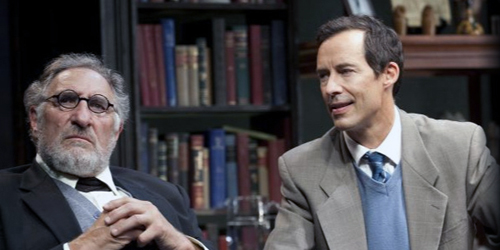
By Cynthia Citron
SANTA MONICA, California — So this Jewish atheist gets into a conversation with an atheist convert to the Church of England…
Sounds like there should be a shaggy dog punch-line at the end, but instead you get Mark St. Germain’s riveting play, Freud’s Last Session , an imagined discussion between Sigmund Freud (Judd Hirsch) and philosopher C.S. Lewis (Tom Cavanagh). And the punch-lines generally take the form of “Gotcha!”s as the two intellectual giants refute each other’s positions.
Freud, who was 83 and very close to dying at that time (September 1939), was suffering from mouth cancer, and the fabulous Judd Hirsch is so convincing in his suffering that he makes you wince in sympathy.
Although they lived in England at the same time, there is no evidence that he and C.S. Lewis ever met, but their dialogue and their banter is taken from their writings, and their comments dovetail beautifully.
As they listen to Neville Chamberlain on the radio, they discuss the inevitable upcoming war. “When I looked out my window at home,” Freud says bitterly, “I saw only Nazis burning my books.”
Lewis had written a book, Pilgrim’s Regress, which satirized Freud as a man of “bombastic self-importance” and a “vain, ignorant old man” and he urges Freud not to take it personally. “But,” he adds, “I can’t apologize for taking issue with your worldview when it completely contradicts my own.”
“Which is?” Freud asks.
“That there is a God. That a man doesn’t have to be an imbecile to believe in Him. And we feeble-minded who do, are not, as you claim, suffering from a pathetic “obsessional neurosis”, Lewis responds.
Even so, Lewis admits to being curious to meet Freud. “Your writings are always thought provoking,” he says. “When I was a student in University we devoured (your) every book to discover our latest perversions.”
They discuss the “God myths” of ancient cultures and of the Old and New Testaments and Lewis, who had shared Freud’s belief until recently that the concept of a Creator was patently infantile is accused by Freud of being the victim of either a conversion experience or an hallucinatory psychosis. “I want to learn why a man of your intellect, one who shared my convictions, could suddenly abandon truth and embrace an insidious lie,” Freud says.
“I was the most reluctant convert in all England,” Lewis admits. “There was nothing I had a greater hatred of than being told what to do. That was the wonderful attraction of atheism: it satisfied my wish to be left alone. The God of the Bible is a bullying Busybody.”
He delineates the logic that made him accept Christ as the son of God, however. There are three possibilities, he claims. Either Christ is a lunatic, or he was consciously deceiving his followers for some other purpose.
“Power?” Freud interjects. “His followers deified him. He performed magic trick miracles. His strategy was a complete success.”
“I wouldn’t call any strategy ending with crucifixion a complete success,” Lewis responds wryly.
The third alternative, Lewis continues, is that Christ really is the Son of God.
Freud, on the other hand, ends this segment of the discussion by demanding, “Do you think it coincidence Jesus demands his followers must be like children to enter Heaven? It’s because man has never matured to face that he is alone in the universe and religion makes the world his nursery! I have two words for you: Grow up!”
The discussion is totally absorbing and interspersed, as serious conversation always is, with interruptions, digressions, tongue-in-cheek repartee, and phone calls. But the men manage to reveal their relationships with fathers they loathed and even veer onto the elusive subject of sex. Lewis was living at the time with his brother and the mother of his deceased best friend, and Freud questions Lewis’ attraction to the older woman. Whereupon Lewis questions Freud’s relationship with his beloved daughter Anna.
Neither question is answered, but both men repeat Freud’s observation, “I always consider what people tell me less important than what they cannot.”
Freud’s Last Session, suggested by Dr. Armand Nicholi, Jr.’s book The Question of God, is impeccably directed by Tyler Marchant and beautifully staged by Brian Prather in a comfortable, book-and-artifact-laden study in London that mirrors Freud’s previous study in Vienna. Mark Mariani’s costumes are appropriate, and Clifton Taylor and Beth Lake provide vivid lighting and sound design.
But most of all, it’s a pleasure to watch the formidable Judd Hirsch and Tom Cavanagh spar with each other. They are well-matched in this intelligent production as they deal with God, love, pain, death, fathers, morality, good and evil, myths, and sex. Who could ask for anything more?
Freud’s Last Session will continue at the Broad Stage, 1310 11th Street, Santa Monica, Tuesdays through Fridays at 7:30 pm, Saturdays at 4 and 8 pm, and Sundays at 1 and 5 pm through February 10th. Call 310.434.3412 for tickets.
*
Citron is Los Angeles bureau chief for San Diego Jewish World. She may be contacted via cynthia.citron@sdjewishworld.com